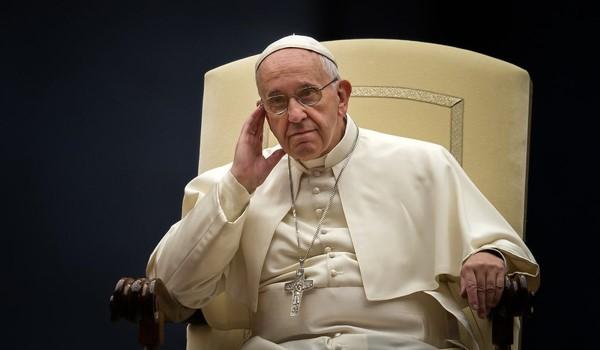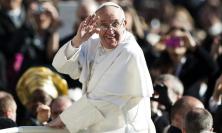(Photo shared via Creative Commons)
In a major interview published by The Tablet and Commonweal in the middle of Holy Week, Pope Francis shares with his British biographer spiritual wisdom about the meaning of the coronavirus pandemic. Austen Ivereigh reveals exclusively to Thinking Faith how the interview – the pope’s first for English-language Catholic publications – came about, and how the pope sees a world in crisis being offered the chance to change.
In a lovely blend of old-world graciousness and contemporary efficiency, the hand-written note from Pope Francis had been scanned into a PDF and emailed by his secretary. Querido hermano – ‘dear brother’ – it began.
It was the last week of March, and the world was in lockdown. I had reached out to Francis on impulse: the virus crisis was now hitting the English-speaking world hard, and I felt we needed to hear from him. How should we embrace this time? What was its summons? I proposed an interview. The note was his reply; it sounded like a no. But he had added that ‘in anticipation of the right moment’, could I send him some questions for him to think about? I wrote out six themes with various questions to encourage his reflections, sent them, and heard nothing more.
A few days later, on 27 March, I watched his remarkable urbi et orbi address, an iconic, Moses-like moment. It was clear he saw this time of fear and sickness as a dark shadow, but also as a time of conversion. I wrote a piece for Commonweal called ‘The Pope and the Plague’ that tried to show him pointing to the grace that God always offers in times of tribulation.
I wrote again to thank Francis for his guidance and offered to recast the questions in the light of the urbi et orbi. A second note came back: the current situation had hit him quite hard, he was trying to make sense of it while getting over a nasty bronchitis and dealing with the extra workload the pandemic had landed on him. But he said he still prayed the prayer of St Thomas More for a sense of humour. Touched, I sent back some words of thanks and encouragement, reassuring him that it was clearly the wrong time for an interview.
Then, suddenly, a call last Friday from his secretary: would it be alright if the Holy Father recorded his answers? The audio file, when I got it the next day, was 45 minutes long. It was everything I had hoped for, but much more. In his first interview for an English-language Catholic publication, the pope was giving us a route-map for a world in lockdown, charting a path out of our desolation into a new future. It was the conversion he had spoken of in his urbi et orbi, but fleshed out, and packed with spiritual wisdom.
In my book on the pontificate, Wounded Shepherd, I said Francis’ governance was like that of a spiritual director, leading the people of God on a journey of re-centering, of revaluing priorities. His task as church leader has been to encourage us to embrace the opportunity for conversion, and – a particular gift of Jorge Mario Bergoglio’s that his fellow Jesuits often remark on – to detect and point out the false consolations and temptations that are obstacles to that change. At no time in most of our lives is that truer than now, in virus lockdown, imposing retreat-like conditions. As the pope said in his urbi et orbi, this is a time of testing, ‘a time to choose what matters and what passes away, a time to separate what is necessary from what is not.’
What the interview shows is that we are not just passive spectators in this process, but its agents; it is our choices that will condition the future that is being incubated. In discerning what is of God and what is not, we grasp, for example, that pain, loss and fear can paralyse us, persuading us that nothing really matters, that action is pointless; the virus is like a darkness that paralyses all it touches with silence and emptiness, as the pope arrestingly described it in St Peter’s Square. How not to be drawn in by it? He began our interview talking about concrete actions: he is praying more; he is planning for the ‘tragic and painful’ aftermath – possibly the only world leader who is – with one of the Vatican departments; and in his prayer he thinks of people, which ‘anoints’ him. Thoughts of concrete people, with names and faces and needs, spill out into concrete actions: the decision to live-stream his daily Mass (watched now by half a million each day) and to step up the work of the papal almoner for the sick and hungry around him in Rome.
He is thinking, he says, of how to accompany the people of God at this time. Lockdown imposes isolation, distance, solitude: how to break through these walls? Asked about the various characters in Alessandro Manzoni’s novel The Betrothed, he picks out the saintly cardinal Federigo, not to praise him but to illustrate the people’s need for their pastors to stay close, to resist the urge to be self-isolating shepherds living in fear of their contagious sheep. He holds up the Capuchins of the novel as exemplars, the friars who (he does not need to say) get infected treating the infected. There are risks in self-giving and service, but that is always true; the virus simply dramatises the choices we always face. If the heroes of Manzoni’s novel are the Capuchins, the heroes of our coronavirus story, says Francis, are doctors, nurses, volunteers and shop workers. But it’s the same choice: to serve and risk, or to live a shrivelled life of fearful self-enclosure.
Most of us do not have the chance to serve in that heroic way: we are not nursing in a Covid ward, or stocking supermarket shelves. We must stay at home, care for children, or work (if we still have it). Yet at home, too, the pope suggests, the ordinary Christian in lockdown faces a choice: ‘we can either get depressed and alienated’ – the false consolation of melancholy or escapism – ‘or we can get creative’. Creativity, he says early in the interview, opens up fresh horizons, creates new ways of being, opens us to the transcendent. Later, talking of how the crisis will change the Church, he speaks of the freedom of the Spirit in the midst of crisis: how, in yearning and in remembering (we will return to this shortly), we open ourselves to the action of the Holy Spirit, and new possibilities present themselves. If we can be present, in other words, to the pain of our now, yet open to creative ways of moving on from our present, we help create our future. In the pope’s words, ‘we take care of the now, for the sake of tomorrow.’
What is true for us at home, is true for our society as a whole. The longest and most heartfelt part of the interview was in response to my question about the possibility of conversion in our economy and ecology – the etymology of both words is the oikos, our ‘environment’ in the broadest sense. In response to the previous question he had spoken of the throwaway culture that treats human beings as things. Now, asked if things could be different in the future, he spoke of the importance of remembering.
It is, in many ways, the heart of the interview; in the recording, it is when he sounds at his most intense, as if this is welling up from deep within.
His point is that we change by remembering, while to forget condemns us to stay the same. But remembering must be honest: it must surface truth. A ‘selective memory’ that screens out what is painful and edits history to suit our sentimentality – the Normandy landings are no longer a place where thousands were massacred, but a monument to the rebirth of democracy – is no good. What changes us, he says, is ‘a conversion through remembrance’, and here he cites the First Week of the Spiritual Exercises.
First-Week remembering is the very opposite of selective memory, or nostalgia. It is to open up and roll out our past like an old carpet retrieved from the attic, and to look at everything on it: the moths and the patches as well as the beautiful (if faded) patterns on it. It is to face our sin, and feel shame; to become aware of God walking with us, often in hidden ways, and to feel that mix of gratitude and horror that is the grace of the First Week. It is a time to face our double-think and our hidden disgrace, a call to integrity and honesty.
Francis invites us to look honestly. We have frenetically produced and consumed, and natural disaster has followed; now we are called to contemplate, not use, the world around us. The grace on offer to us in this time of climate catastrophe and economic collapse is to do things differently. If we just ‘file it away and go back to where we were’, we will have lost the chance to change, refused the grace on offer to us in times of tribulation. The crisis will wreak its havoc; we will suffer, yet be unchanged. But if we are willing to go a different way, Francis points to a royal path. It is one he has insisted on for decades. It is the path of Jesus, the path of kenosis. It is to ‘go to the underground’, to go out to meet Christ in the suffering flesh of the poor, to discover their humanity.
For the Church, too, this is a time for conversion. Francis resists any false polarity between Church as people of God and Church as institution. The Church ‘is’ institution, he insists, in the sense that it is the body of the people of God gathered together, united and acting; it is a concrete expression of togetherness, not some nebulous, faux-communal idea. But what creates the institution is the Holy Spirit, and ‘the Church that comes out of the crisis’ is one that needs to live better in the tension of harmony and disorder that is characteristic of the Spirit. In crisis we need new ways of doing old things, flexibility and creativity. That way we collaborate with what is being born.
He ends with a favourite idea of his: that old and young need each other. Like a plant, the young buds cannot fruit without the old roots firmly in the ground. There is a tragedy in our time that the virus has brought to the surface: the self-isolated elderly of the time of coronavirus do not look so different from the elderly isolated by their children’s rejection in normal times. Only by integrating the rejected can we move forward; only by watering our roots can we grow. Like Aeneas after the defeat in Troy – which can stand for the collapse of our globalised technocracy – we must make for the mountain with our parents on our backs.
I had a final note from Pope Francis after I sent him the edited transcript. He thanked me warmly for ordering his thoughts, joking that I had moved him ‘from chaos to cosmos’. His graciousness and humour are a beacon. If, in our interview, the world catches a bit of these at this dark time, how much better a place it will already be.
READ THE INTERVIEW:
- 'Pope Francis says pandemic can be a "place of conversion"' in The Tablet >>
- ‘"A Time of Great Uncertainty": An Interview with Pope Francis' in Commonweal >>
Austen Ivereigh is a fellow in Contemporary Church History at Campion Hall, University of Oxford. He is the author of Wounded Shepherd: Pope Francis’s Struggle to Convert the Catholic Church (Henry Holt, 2019).






